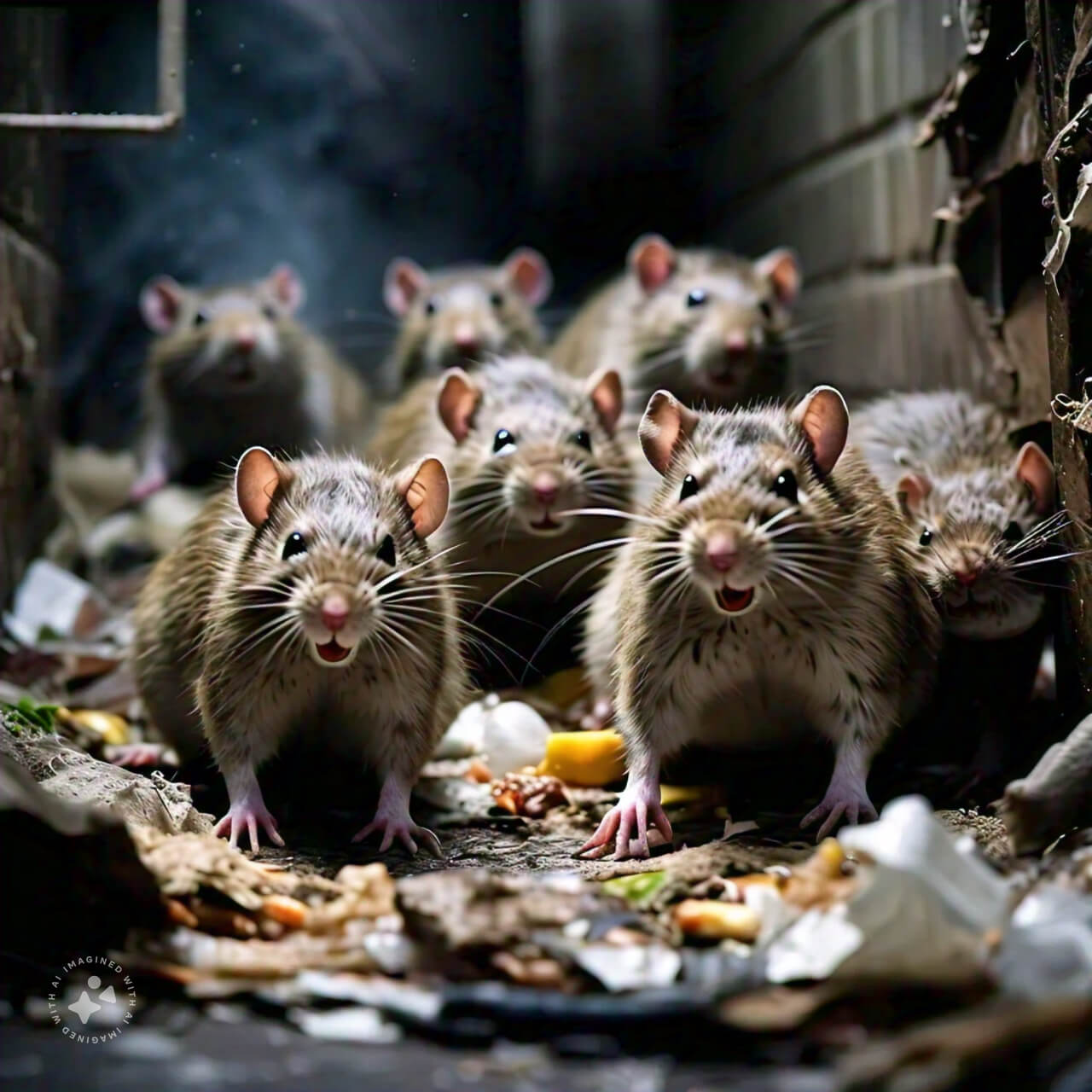Unraveling the Mystery: Why Your Pet Rats May Be Smelling Worse Than Usual
Rats are generally clean animals, often grooming themselves and each other multiple times a day. However, if you’ve noticed that your pet rats are starting to emit a stronger odor than usual, it may be cause for concern and investigation. Here’s a deep dive into the common reasons behind this issue and how to resolve it.
Identifying the Source of the Smell
The first step in addressing the odor issue is identifying where it’s coming from. Rats themselves should not have a strong odor, but their environment might. Check their cage, bedding, and accessories for signs of urine build-up or fecal matter that hasn’t been cleaned up promptly. Regular maintenance is key to preventing bad smells.
Dietary Influences on Rat Odor
What your rats eat can significantly affect how they smell. A diet high in protein can cause their urine to become more pungent. Evaluate your rats’ diet and consider balancing it with more vegetables and grains to see if it makes a difference in the odor levels.
Health Issues That Can Cause Odors
Sometimes, a bad smell could be indicative of a health problem. Urinary tract infections, abscesses, or even dental issues can lead to unpleasant odors in rats. If you suspect a health issue, it is crucial to consult with a veterinarian who specializes in small animals and can provide the necessary treatment.
Improving Cage Hygiene
Enhancing the cleanliness of your rat’s living environment is paramount. Switch to more absorbent bedding, clean the cage more frequently, and make sure that all feeding dishes and water bottles are washed daily. Additionally, consider larger or more ventilated cages to help reduce the concentration of odors.
By understanding and addressing these factors, you can help ensure that your pet rats remain clean and relatively odor-free. Remember, keeping a healthy environment is not only important for controlling odors but also for ensuring the overall well-being of your furry friends.
Odor Issues: Common Reasons Behind Your Rat’s Unpleasant Scent
Rats are popular pets due to their intelligent and sociable nature. However, rat owners may sometimes notice an unpleasant odor emanating from their pet or its living environment. Understanding the common causes of these odors can help you maintain a clean and comfortable space for your furry friends.
Understanding Rat Odors: What’s Normal and What’s Not
It’s essential to discern between normal and abnormal rat odors. Rats are naturally clean animals that groom themselves several times a day. A mild, musky odor is normal and varies depending on the rat’s age, diet, and health. However, a strong, foul smell can indicate health issues or poor habitat conditions.
Dietary Influences on Rat Odor
What your rat eats significantly affects its scent. High-protein diets can intensify the smell of their urine, while diets rich in fruits and vegetables can lead to softer, less odorous waste. Ensuring a balanced diet not only keeps your rat healthy but also helps minimize offensive smells.
The Impact of Poor Cage Hygiene
A primary source of bad odors is a dirty cage. Ammonia from urine can quickly build up, creating a strong smell and an unhealthy environment for your pet. Regular cleaning of the cage, at least once a week, and immediate removal of soiled bedding and uneaten food can drastically reduce odors.
Health Issues That Can Cause Bad Smells
Sometimes, the unpleasant smell from your rat can be a sign of health issues such as infections or dental problems. If you notice a sudden change in the odor intensity, it’s advisable to consult a veterinarian to rule out any underlying health problems.
Tips for Controlling Odor in Rat Enclosures
Ensuring good ventilation in the rat’s living area can significantly reduce odor buildup. Additionally, choosing the right bedding, such as aspen shavings or recycled paper products, can absorb odors better than other materials. It’s also beneficial to have more than one habitat or to increase the size of the existing habitat to reduce the concentration of odors in one area.
Conclusion: Maintaining a Fresh Environment for Your Rats
By understanding and addressing the common reasons behind your rat’s unpleasant scent, you can create a healthier and more enjoyable living environment for both you and your pets. Regular care and maintenance of your rat’s diet and habitat are key to preventing odor issues.
This article should give you a comprehensive understanding of why your rat might smell and how you can improve their environment to keep odors at bay.
From Bedding to Diet: Surprising Factors That Can Cause Your Rats to Smell Bad

Rats are delightful pets known for their intelligence, playfulness, and social nature. However, like all pets, they can sometimes emit unpleasant odors. If you’re noticing a distinct smell from your pet rats, it might not just be a simple case of needing a bath. Several surprising factors can contribute to this issue, from their bedding choices to their diet. Understanding these factors can help you keep your rat’s environment fresh and odor-free.
The Impact of Bedding on Rat Odors
The type of bedding you use in your rat’s cage plays a pivotal role in controlling odors. Some bedding materials are better at absorbing smells than others. For example, aspen shavings and paper-based products are excellent for odor control, whereas cedar and pine shavings should be avoided as they can be harmful to your rat’s respiratory system. It’s essential to clean and change the bedding regularly—failing to do so can lead to a buildup of ammonia from urine, which is a primary source of bad smells.
Dietary Contributions to Smelly Situations
What your rats eat can significantly affect how they smell. A diet high in protein, for example, can cause their urine to become more pungent. To keep odors in check, provide a balanced diet that is specially formulated for rats, which typically includes low protein and high fiber contents. Foods like fruits and vegetables should be given in moderation to avoid spoilage and overconsumption, which can also contribute to undesirable odors.
Hygiene Habits: More Than Just Surface Cleaning
Keeping your rat’s cage clean is crucial, but it’s not just about wiping down surfaces. Deep cleaning the cage, including the accessories and toys, is necessary to prevent odor buildup. Make sure to regularly wash and disinfect items in the cage that can harbor smells. Additionally, some rats are better at grooming themselves than others. Observing your rat’s grooming habits and assisting with gentle, safe wipes can help reduce odors.
Water and Humidity: Unseen Contributors
Often overlooked, the water bowl and overall humidity in the cage can influence how your rat smells. Make sure the water is fresh and changed daily to prevent the growth of bacteria and mildew, which can add to the cage’s overall odor. Similarly, high humidity can amplify smells and encourage the growth of bacteria and mold. Using a dehumidifier in the room or ensuring proper ventilation can help mitigate this issue.
By paying attention to these factors, you can significantly reduce the odors associated with your pet rats, making your experience as a rat owner more enjoyable and less pungent. Remember, a clean, well-maintained environment is beneficial not just for reducing smells, but also for the health and happiness of your furry friends.
Keeping It Fresh: Understanding and Combatting Bad Odors in Rat Enclosures
Introduction to Rat Enclosure Odors
Keeping your rat’s habitat fresh is crucial not only for the comfort of your home but for the health and happiness of your pet rats. Understanding the sources of bad odors and how to effectively manage them can transform your experience of caring for these intelligent and affectionate animals.
Identifying the Sources of Odor
Poor Ventilation: A lack of adequate air circulation can lead to stagnant conditions that exacerbate odor problems. Ensuring your rat’s cage has proper ventilation will help keep the air fresh and reduce the buildup of unpleasant smells.
Bedding Material: The type of bedding used in rat enclosures plays a significant role in odor control. Some materials, like cedar and pine, might seem like good choices but can actually be harmful to your rat’s respiratory system and do little to control odors.
Waste Management: Rats are clean animals, but they do produce waste that can quickly become smelly if not regularly cleaned out. Establishing a consistent cleaning schedule is essential for keeping odors at bay.
Choosing the Right Bedding
Absorbency and Safety: Opt for bedding that is highly absorbent and safe for rats, such as recycled paper products or aspen shavings. These materials not only control odors effectively but also minimize the risk of respiratory issues.
Frequency of Change: Regularly changing the bedding in your rat’s cage is crucial. Depending on the number of rats and the type of bedding, this might need to be done as frequently as once a week.
Cleaning Techniques That Work
Daily Spot Cleaning: Remove soiled bedding and uneaten food daily. This simple step can drastically reduce the overall smell of the enclosure.
Deep Cleaning: Perform a thorough cleaning of the entire cage every week. This involves replacing all bedding, washing the cage with a pet-safe disinfectant, and ensuring that all accessories and toys are clean.
Dietary Considerations
Impact of Diet on Odor: What your rats eat can affect how their waste smells. High-quality commercial rat food, supplemented with fresh fruits and vegetables, can help keep your rats’ digestive systems healthy and reduce odors.
Avoiding Smelly Foods: Some foods may make your rats’ waste smell worse. Experiment with their diet and monitor how changes affect the odor to find a balance that works for you and your pets.
Conclusion: A Fresh Start
Combating odors in your rat’s enclosure doesn’t have to be a daunting task. With the right materials, cleaning strategies, and dietary management, you can keep your rat’s environment smelling fresh and ensure it remains a healthy and pleasant space. Remember, a clean cage is a key to a happy rat and a happy pet owner.




